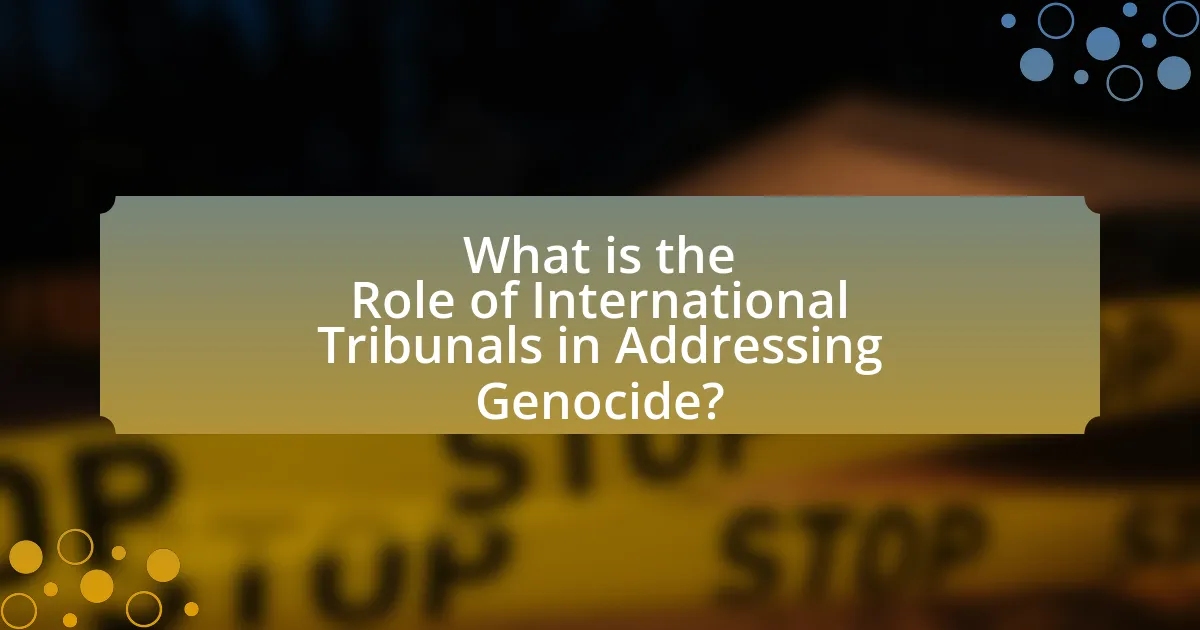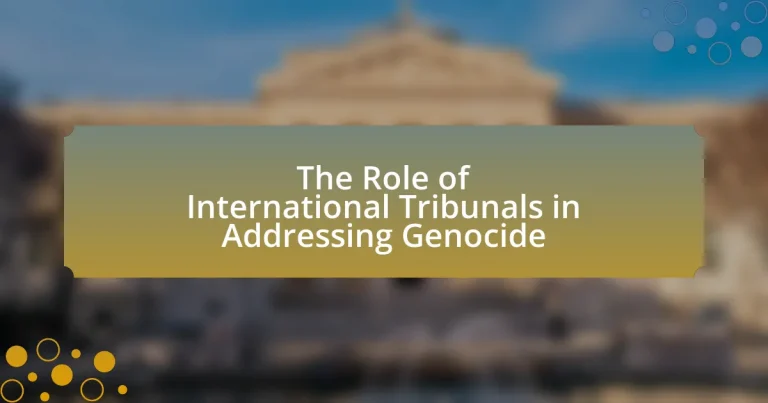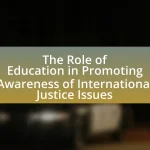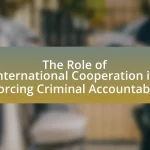International tribunals, such as the International Criminal Tribunal for Rwanda (ICTR) and the International Criminal Court (ICC), play a vital role in addressing genocide by providing a legal framework for the prosecution of individuals responsible for these crimes. The article outlines how these tribunals define genocide, interpret the intent behind it, and the historical context that led to their establishment. It discusses the legal frameworks governing genocide, the challenges faced in jurisdictional conflicts, and the impact of tribunal proceedings on victims and survivors. Additionally, the article examines criticisms of international tribunals, their limitations in delivering justice, and potential future developments, including the integration of technology and best practices to enhance their effectiveness.

What is the Role of International Tribunals in Addressing Genocide?
International tribunals play a crucial role in addressing genocide by providing a legal framework for the prosecution of individuals responsible for such crimes. These tribunals, such as the International Criminal Tribunal for Rwanda (ICTR) and the International Criminal Court (ICC), are established to hold accountable those who commit genocide, thereby promoting justice and deterring future atrocities. For instance, the ICTR successfully prosecuted key figures involved in the Rwandan genocide, leading to convictions that reinforced the principle of individual criminal responsibility under international law. This legal accountability not only serves to deliver justice for victims but also contributes to the historical record and the prevention of impunity for future genocides.
How do international tribunals define genocide?
International tribunals define genocide as acts committed with intent to destroy, in whole or in part, a national, ethnical, racial, or religious group. This definition is established in the Convention on the Prevention and Punishment of the Crime of Genocide, adopted by the United Nations General Assembly in 1948, and is further elaborated in the statutes of various international courts, such as the International Criminal Court and the International Criminal Tribunal for the former Yugoslavia. These statutes outline specific acts that constitute genocide, including killing members of the group, causing serious bodily or mental harm, and deliberately inflicting conditions calculated to bring about the group’s physical destruction.
What legal frameworks govern the definition of genocide?
The legal frameworks that govern the definition of genocide include the United Nations Convention on the Prevention and Punishment of the Crime of Genocide (1948) and the Rome Statute of the International Criminal Court (1998). The Genocide Convention explicitly defines genocide as acts committed with intent to destroy, in whole or in part, a national, ethnical, racial, or religious group. The Rome Statute further elaborates on these definitions and establishes the International Criminal Court’s jurisdiction over genocide, emphasizing the need for accountability and justice. These frameworks are foundational in international law, providing the legal basis for prosecuting individuals accused of genocide.
How do international tribunals interpret the intent behind genocide?
International tribunals interpret the intent behind genocide as a specific and deliberate intention to destroy, in whole or in part, a national, ethnical, racial, or religious group. This interpretation is grounded in the legal definitions established by the Genocide Convention and further clarified in the judgments of tribunals such as the International Criminal Tribunal for Rwanda (ICTR) and the International Criminal Court (ICC). For instance, the ICTR in the case of Prosecutor v. Akayesu emphasized that the intent to commit genocide must be proven beyond a reasonable doubt, highlighting the necessity of demonstrating a specific intent to destroy a group. This requirement for specific intent distinguishes genocide from other crimes and is crucial for establishing accountability in international law.
What historical context led to the establishment of international tribunals?
The establishment of international tribunals was primarily driven by the aftermath of World War II and the Holocaust, which highlighted the need for accountability for war crimes and crimes against humanity. The Nuremberg Trials in 1945-1946 set a precedent for prosecuting individuals for genocide and other severe violations of international law, establishing a framework for future tribunals. This historical context underscored the international community’s recognition of the necessity to prevent impunity and promote justice, leading to the creation of various tribunals, such as the International Criminal Tribunal for the former Yugoslavia in 1993 and the International Criminal Tribunal for Rwanda in 1994, aimed specifically at addressing genocide and related atrocities.
What major genocides prompted the creation of these tribunals?
The major genocides that prompted the creation of international tribunals include the Holocaust, the Rwandan Genocide, and the Yugoslav Wars. The Holocaust led to the establishment of the Nuremberg Trials in 1945, which prosecuted Nazi war criminals for crimes against humanity. The Rwandan Genocide in 1994 resulted in the formation of the International Criminal Tribunal for Rwanda (ICTR) in 1994, aimed at prosecuting those responsible for the mass killings. Additionally, the atrocities during the Yugoslav Wars in the 1990s led to the establishment of the International Criminal Tribunal for the former Yugoslavia (ICTY) in 1993, addressing war crimes and genocide committed in the region.
How have past failures influenced current tribunal structures?
Past failures in international tribunals, such as the inadequacies of the International Criminal Tribunal for Rwanda and the International Criminal Tribunal for the former Yugoslavia, have significantly influenced current tribunal structures by prompting reforms aimed at enhancing efficiency, accountability, and victim participation. These historical shortcomings highlighted the need for clearer mandates, improved procedural frameworks, and better integration of local legal systems, leading to the establishment of hybrid tribunals like the Special Tribunal for Lebanon, which combines international and domestic legal principles. Additionally, the lessons learned from these failures have resulted in the adoption of more robust mechanisms for evidence collection and witness protection, as seen in the International Criminal Court’s emphasis on safeguarding victims’ rights and ensuring fair trials.
What are the primary functions of international tribunals in genocide cases?
International tribunals in genocide cases primarily function to prosecute individuals accused of committing genocide, ensure accountability, and provide justice for victims. These tribunals, such as the International Criminal Tribunal for Rwanda and the International Criminal Tribunal for the former Yugoslavia, are established to investigate and adjudicate serious violations of international law, specifically targeting acts of genocide as defined by the Genocide Convention. They gather evidence, conduct trials, and deliver verdicts, thereby reinforcing the principle that perpetrators of such heinous crimes will face legal consequences. Additionally, these tribunals contribute to the development of international law by establishing legal precedents and clarifying the definitions and elements of genocide, which aids in the prevention of future atrocities.
How do tribunals investigate allegations of genocide?
Tribunals investigate allegations of genocide through a systematic process that includes gathering evidence, examining witness testimonies, and analyzing documents. These investigations often involve the collection of physical evidence from crime scenes, interviews with survivors and witnesses, and collaboration with international organizations to compile comprehensive reports. For instance, the International Criminal Tribunal for the former Yugoslavia (ICTY) utilized forensic evidence and testimonies to substantiate claims of genocide during the Bosnian War, leading to convictions based on detailed investigations. This methodical approach ensures that the findings are credible and can withstand legal scrutiny in court.
What role do tribunals play in the prosecution of perpetrators?
Tribunals play a crucial role in the prosecution of perpetrators by providing a legal framework for holding individuals accountable for serious crimes, including genocide. These judicial bodies, such as the International Criminal Tribunal for the former Yugoslavia and the International Criminal Tribunal for Rwanda, are established to ensure that those responsible for atrocities face justice. They operate under international law, allowing for the prosecution of individuals regardless of their official capacity, thereby reinforcing the principle that no one is above the law. The establishment of these tribunals has led to landmark convictions, such as that of Radovan Karadžić for genocide and war crimes, demonstrating their effectiveness in delivering justice and deterring future violations.
How do international tribunals interact with national legal systems?
International tribunals interact with national legal systems primarily through the principle of complementarity, which allows these tribunals to prosecute crimes only when national courts are unwilling or unable to do so. This interaction is evident in the workings of the International Criminal Court (ICC), which relies on national jurisdictions to investigate and prosecute genocide, war crimes, and crimes against humanity. For instance, the ICC’s Rome Statute emphasizes that states have the primary responsibility to prosecute such crimes, thereby reinforcing national legal systems while providing a mechanism for international oversight. Additionally, international tribunals may influence national legal systems by establishing legal precedents and standards, as seen in the rulings of the International Criminal Tribunal for the former Yugoslavia (ICTY), which have been incorporated into national laws of various countries.
What challenges arise from jurisdictional conflicts between tribunals and national courts?
Jurisdictional conflicts between tribunals and national courts create significant challenges, primarily including issues of legal authority, enforcement of judgments, and the potential for inconsistent rulings. These conflicts arise when national courts assert their jurisdiction over cases that international tribunals also seek to adjudicate, leading to disputes over which legal body has the rightful authority to hear a case. For instance, the International Criminal Court (ICC) may face resistance from national governments that prefer to handle cases domestically, undermining the ICC’s mandate to prosecute serious crimes like genocide. Additionally, when national courts issue rulings that contradict those of international tribunals, it can result in confusion and a lack of coherence in international law. This situation complicates the enforcement of international legal standards and can hinder accountability for perpetrators of genocide, as seen in various cases where national courts have dismissed charges that international bodies have deemed valid.
How can national courts complement the work of international tribunals?
National courts can complement the work of international tribunals by enforcing international law at the domestic level and providing additional avenues for justice. They can prosecute individuals for genocide and related crimes when international tribunals are unable to do so, thereby ensuring accountability. For instance, the principle of universal jurisdiction allows national courts to try cases of genocide regardless of where the crime occurred, as seen in cases like the prosecution of former Chilean dictator Augusto Pinochet in Spain. This collaboration enhances the overall effectiveness of international justice systems by filling gaps and addressing cases that may not reach international tribunals due to jurisdictional limitations or resource constraints.
What impact do international tribunals have on victims and survivors?
International tribunals significantly impact victims and survivors by providing a platform for justice, recognition, and reparations. These tribunals, such as the International Criminal Tribunal for the former Yugoslavia and the International Criminal Court, enable victims to testify and share their experiences, which contributes to their healing process and acknowledges their suffering. Furthermore, these legal bodies often mandate reparations for victims, which can include financial compensation and support services, thereby assisting in their recovery. The establishment of accountability through these tribunals also serves to deter future atrocities, as it reinforces the principle that perpetrators of genocide and war crimes will face legal consequences. This dual role of providing justice and promoting deterrence is crucial for the empowerment and restoration of victims and survivors in post-conflict societies.
How do tribunals provide justice and reparations to victims?
Tribunals provide justice and reparations to victims by holding perpetrators accountable for their actions and facilitating compensation for the harm caused. These judicial bodies, such as the International Criminal Court and various ad hoc tribunals, investigate and prosecute individuals for crimes like genocide, war crimes, and crimes against humanity, thereby affirming the rule of law and delivering justice. For instance, the International Criminal Tribunal for the former Yugoslavia awarded reparations to victims through its judgments, which included financial compensation and acknowledgment of suffering. This process not only serves to punish offenders but also helps restore dignity to victims, as seen in cases where tribunals have mandated states to provide reparations, thus reinforcing the principle that victims deserve recognition and restitution for their suffering.
What psychological effects do tribunal proceedings have on survivors?
Tribunal proceedings can have profound psychological effects on survivors, including increased anxiety, depression, and post-traumatic stress disorder (PTSD). Survivors often experience a resurgence of trauma as they recount their experiences during testimonies, which can trigger painful memories and emotions. Research indicates that the stress of participating in legal processes can exacerbate feelings of helplessness and vulnerability, leading to long-term mental health challenges. A study published in the Journal of Traumatic Stress by authors such as Danieli and Kauffman highlights that survivors may also face social stigma and isolation, further complicating their psychological recovery.
What criticisms do international tribunals face in addressing genocide?
International tribunals face significant criticisms in addressing genocide, primarily related to issues of effectiveness, impartiality, and accessibility. Critics argue that these tribunals often struggle to deliver timely justice, as seen in the International Criminal Tribunal for Rwanda, which took years to prosecute cases, leading to perceptions of inefficiency. Additionally, allegations of bias, particularly in the selection of cases and the treatment of defendants, undermine the credibility of these institutions; for instance, the International Criminal Court has been criticized for disproportionately targeting African leaders while overlooking atrocities in other regions. Furthermore, the complex legal processes and high costs associated with these tribunals can limit access for victims seeking justice, as highlighted by the challenges faced by survivors in navigating the legal system. These criticisms collectively raise concerns about the overall effectiveness and fairness of international tribunals in addressing genocide.
How do issues of bias and selectivity affect tribunal legitimacy?
Issues of bias and selectivity significantly undermine tribunal legitimacy by creating perceptions of unfairness and partiality. When tribunals exhibit bias, whether through the selection of cases or the treatment of evidence, they risk losing the trust of the international community and the affected populations. For instance, the International Criminal Tribunal for the former Yugoslavia faced criticism for perceived selectivity in prosecuting only certain individuals while overlooking others, which led to questions about its impartiality and effectiveness. This perception can diminish the tribunal’s authority and hinder its ability to promote justice and accountability, essential components in addressing genocide.
What are the limitations of international tribunals in delivering justice?
International tribunals face significant limitations in delivering justice, primarily due to issues of jurisdiction, enforcement, and political influence. Jurisdictional limitations arise when tribunals lack the authority to prosecute certain crimes or individuals, often because states do not recognize their jurisdiction or have not ratified relevant treaties. Enforcement challenges stem from the tribunals’ reliance on member states to arrest and surrender accused individuals, which can lead to impunity if states refuse to cooperate. Additionally, political influence can compromise the impartiality of proceedings, as powerful nations may exert pressure to shape outcomes or shield allies from prosecution. These factors collectively hinder the effectiveness of international tribunals in achieving justice for victims of genocide and other serious crimes.
What future developments can be anticipated for international tribunals?
Future developments for international tribunals are likely to include enhanced mechanisms for accountability, increased collaboration with national courts, and the integration of technology in evidence gathering and case management. These advancements aim to improve the efficiency and effectiveness of tribunals in addressing genocide and other serious crimes. For instance, the International Criminal Court (ICC) has already begun utilizing digital tools for remote hearings and evidence presentation, which can streamline processes and expand access to justice. Additionally, the establishment of hybrid tribunals, which combine international and domestic legal frameworks, is anticipated to grow, as seen in recent cases in countries like Cambodia and Sierra Leone, allowing for localized justice while maintaining international standards.
How might evolving international law shape tribunal functions?
Evolving international law may significantly shape tribunal functions by introducing new legal standards and frameworks that enhance accountability for genocide. For instance, the establishment of the International Criminal Court (ICC) has set precedents for prosecuting individuals for crimes against humanity, thereby influencing how tribunals operate in terms of jurisdiction and procedural norms. Additionally, the development of customary international law, such as the Responsibility to Protect doctrine, compels tribunals to adapt their functions to address state obligations in preventing genocide. These changes reflect a broader commitment to justice and the protection of human rights, which can lead to more robust mechanisms for enforcement and greater collaboration among international bodies.
What role will technology play in future tribunal proceedings?
Technology will play a transformative role in future tribunal proceedings by enhancing efficiency, accessibility, and evidence presentation. Advanced tools such as artificial intelligence will streamline case management, allowing for quicker processing of documents and data analysis. Virtual reality and digital platforms will facilitate remote participation, making it easier for witnesses and legal representatives to engage from various locations, thereby increasing accessibility for those unable to travel. Furthermore, blockchain technology can ensure the integrity and security of evidence, providing a tamper-proof record of proceedings. These advancements are supported by the increasing adoption of technology in legal systems worldwide, as seen in the International Criminal Court’s use of digital evidence and remote hearings during the COVID-19 pandemic.
What best practices can enhance the effectiveness of international tribunals?
Best practices that can enhance the effectiveness of international tribunals include ensuring judicial independence, promoting transparency, and fostering cooperation among states. Judicial independence is crucial as it allows judges to make impartial decisions free from external pressures, which is supported by the principle of separation of powers found in many legal systems. Transparency in proceedings builds public trust and accountability, as seen in the International Criminal Court’s practice of making trial documents accessible to the public. Additionally, fostering cooperation among states can facilitate the enforcement of tribunal decisions and the apprehension of fugitives, as demonstrated by the success of the International Criminal Tribunal for the former Yugoslavia in securing arrests through collaborative efforts with various nations.
How can international cooperation improve tribunal outcomes?
International cooperation can improve tribunal outcomes by enhancing the sharing of evidence and resources among nations, which leads to more comprehensive investigations and prosecutions. For instance, collaborative efforts among countries can facilitate the collection of testimonies and documentation that are crucial for establishing accountability in genocide cases. The International Criminal Court (ICC) has demonstrated this through its partnerships with various states, which have provided critical support in gathering evidence and apprehending suspects. Such cooperation not only strengthens the legal framework but also fosters a unified international stance against impunity, thereby increasing the likelihood of successful tribunal outcomes.
What measures can be taken to ensure fair trials in genocide cases?
To ensure fair trials in genocide cases, international tribunals can implement several key measures. These measures include establishing impartial judicial bodies, ensuring the independence of judges, and providing adequate legal representation for defendants. For instance, the International Criminal Tribunal for Rwanda (ICTR) demonstrated the importance of impartiality by appointing judges from diverse legal backgrounds to prevent bias. Additionally, ensuring that defendants have access to competent legal counsel is crucial, as seen in the International Criminal Court (ICC), which mandates legal aid for those unable to afford representation. Furthermore, transparent trial procedures and the protection of witnesses can enhance the integrity of the judicial process, as evidenced by the ICTR’s witness protection programs that helped secure testimonies without compromising safety. These measures collectively contribute to the legitimacy and fairness of trials addressing genocide.


